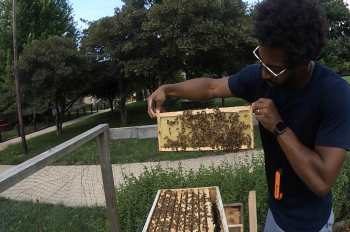Migration, Nationalism, and Welfare Explored in Two New Studies

Issues surrounding migration in Africa and the relationship between migration and the welfare state in Europe and North America are examined in two new publications from Illinois Institute of Technology Professor of Political Science Patrick Ireland, who has conducted literature reviews on both topics and identified areas where further research is needed.
In “Ethnicity, Nationalism, and Migration in Sub-Saharan Africa” (Oxford Research Encyclopedia of International Studies, June 2021), Ireland explores critical cases of migration and broader regional patterns. Ireland compared research on migrants’ experiences across the continent and particularly in Côte d’Ivoire/Burkina Faso, South Africa/Lesotho, and Botswana for the study.
“What are called ‘tribes’ in Africa, those are a creation of the colonial powers,” Ireland says. “[Before colonialism] there wasn’t this hard-bound, ‘I’m this and you’re that’ distinction. This was designed by Europeans to divide and conquer—the boundaries were completely artificial. Those boundaries haven’t changed much since independence. What social scientists call ‘nations’ are when people on a territory feel like they belong together. The whole task in post-colonial African countries became to create that national feeling. And to do that, what ends up happening is that it has also often meant stressing who is part of the nation and who isn’t. That has led to xenophobia, attacks, and attempts to get rid of rivals.”
Ireland looked at research on the countries and regions ranging from pre-colonialism to the present, and found that the role of migration in the nations’ development has only recently begun to be examined.
“Despite the diversity of African migratory experiences, a common theme emerges: migrants have often served as pawns for governments that want to reduce internal ethnic divisions and strengthen national identity in countries that inherited artificial borders at independence,” he says. “Migrants and other ‘outsiders’ have been used to help integrate fragile nation-states.”
In “Migration, Diversity, and the Welfare State: Moving Beyond Attitudes” (Handbook on Migration and Welfare, January 2022), Ireland analyzes the scholarly debate over whether the growing ethnic, cultural, and religious diversity that migrants bring to North America and Europe is resulting in changes in public attitude and public policy regarding welfare benefits.
“I find that while a lot of [quantitative] research has been done on the effect of diversity on popular attitudes about who should receive social benefits, the crucial link between attitudes and public policies has not received enough attention,” he says. “And to take the next logical step means moving beyond policy outputs to real-world outcomes: how welfare delivery truly operates in diversifying societies.”
Ireland found that much research shows that in the United States, public support of welfare benefits has decreased as the country has diversified.
“Social benefits are more under attack when the people getting the benefits are viewed as not being from the same group as the people paying them,” Ireland says. “As the recipients of welfare are defined by right-wing populists as a mixed group of ‘undeserving’ people and not just ‘deserving’ white factory workers, support declines in the majority population. There are studies that have reached different findings for the U.S., however, and the picture in Canada and Western Europe is mixed.”
Ireland recommends that social scientists begin to incorporate more qualitative research into their work, rather than just statistics, to allow migrants to voice the stories of their own experiences.
“The actual treatment of legal migrants, refugees, recognized asylum seekers, and undocumented migrants cannot be left out of the picture,” he says. “It is not enough to stop at popular attitudes toward social spending. It is time for more analysts to come close enough to the ground at least to be able to see the marginalized, vulnerable people who are the reason for caring about this topic in the first place.”




